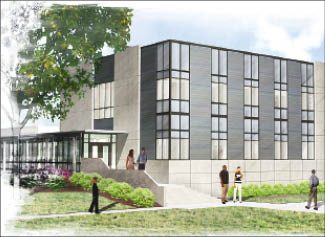
Home » VA center to erect $6.5 million addition
VA center to erect $6.5 million addition
New building in northwest Spokane said needed to meet growing demand for psychological services

October 21, 2010
The Spokane Veterans Affairs Medical Center says it expects to start construction this month on a $6.5 million outpatient mental-health building that will provide space for its behavioral health services to meet the growing psychological needs of veterans it serves here.
The 18,000-square-foot, two-story building is to be erected on the VA hospital campus at 4815 N. Assembly in northwest Spokane and will connect to the north end of the main hospital building, says hospital spokesman Matthew Allen.
Burton Construction Inc., of Spokane, will be the contractor on the project, and Integrus Architecture PS, of Spokane, designed it. The building is expected to be completed in about a year, Allen says.
The project is the latest of several on the VA hospital campus. Last month, the hospital opened a $5.5 million, 10,000-square-foot pharmacy and specialty-care center, and in March, it opened a $1 million, 2,000-square-foot physical-therapy addition.
Quinn Bastian, chief of behavioral health at the hospital, says the new building will provide added space to expand mental-health services currently housed in smaller quarters on the seventh floor of the hospital building.
Bastian says the outpatient mental-health facility will provide a more comfortable setting than the current mental-health quarters.
"We want to create a modern, home-like environment," he says. "Some vets aren't comfortable with cinder-block walls and pale colors," which are common in many institutional settings.
The interior of the building will be designed to have an open feel with a large center atrium, a second-floor balcony, and skylights, yet offices will be well-insulated to ensure privacy, Bastian says.
Demand for mental health services has mushroomed in recent years, he says.
For the 2010 fiscal year that ended Sept. 30, the hospital's behavioral health services department provided services to 1,550 veterans of the Iraq and Afghanistan wars, and it has seen a 48 percent increase in the total number of veterans served over the numbers three years ago, the VA hospital says.
The behavioral health services department has a staff of about 80 people, roughly double the staff it had in 2006 and about a 10th of the total hospital staff, Bastion says. The behavioral-health staff includes seven psychiatrists, a psychiatric nurse practitioner, an advanced nurse practitioner, a physician's assistant, six psychologists, three licensed mental health counselors, 18 social workers, and support staff.
About 20 percent of the veterans treated at the VA hospital here receive some form of treatment through behavioral health services, Bastian says.
The behavioral health services department provides inpatient and outpatient mental-health treatment, suicide prevention programs, treatment programs for post-traumatic stress disorder, substance abuse treatment and counseling, and traumatic-brain-injury treatment and rehabilitation, he says.
The new outpatient mental-health facility will further the VA hospital's current emphasis on integrating mental-health care and primary medical care, Bastian says.
"Behavioral health-care providers will be able to walk down the hall to meet patients in primary care," he says.
Bastian, who has served as a Navy psychologist, was appointed chief of behavioral health services at the hospital in June.
He says he doesn't know whether the new building is the direct result of a spike in veteran suicides reported here between mid-2007 and mid-2008.
That spike coincided with a nationwide increase in veteran suicides. The U.S. Department of Veterans Affairs reported that suicide rates nationally among veterans under 30 years old increased 26 percent in 2007 compared with 2005 and continued to climb through 2009.
"Plans for the building were in progress before I came on board," Bastian says.
He says VA health-care providers across the country are becoming more aware of psychological and traumatic-brain injuries. The federal agency is focusing on finding and implementing proven treatments for post-traumatic stress disorder, an anxiety disorder that can occur after a person experiences highly stressful, dangerous, or violent events, such as combat. Depression, a condition that can lead to suicidal tendencies, often occurs along with post-traumatic stress disorder, the agency says.
VA hospitals across the country also have beefed up suicide prevention programs.
Behavioral health recently expanded its inpatient mental health center at the VA hospital here to 12 beds from eight beds previously, Bastian says.
The outpatient mental health building also will be near the hospital's substance-abuse programs, which are housed in the Operation Enduring Freedom-Operation Iraqi Freedom building at the southeast corner of Freedom Way and Independence Drive.
"There is a significant overlap between mental-health issues and substance abuse," Bastian says.
The hospital isn't just waiting for vets to come to it. Clinics that the VA hospital here operates in Coeur d'Alene and Wenatchee and outreach efforts the agency is making in Eastern Washington, North Idaho, and Western Montana are identifying vets in more rural areas who need care, he says.
About 1,400 vets attended a recent outreach effort, called a stand-down, in Libby Mont., he says. Stand-downs provide settings for veterans in need to sign up for health-care benefits, visit providers in a mobile clinic, and receive surplus clothing, sleeping bags, and a hot meal, Bastian says.
The VA hospital here, along with veterans' outreach groups and community service organizations, also sponsor stand-downs in Colville, Wash., and Post Falls, Idaho. Its behavioral health services department also has a downtown outreach program that targets homeless vets here, Bastian says.
In all, Spokane VMAC serves some 215,000 veterans in Eastern Washington, North Idaho, and western Montana.
Latest News
Related Articles





